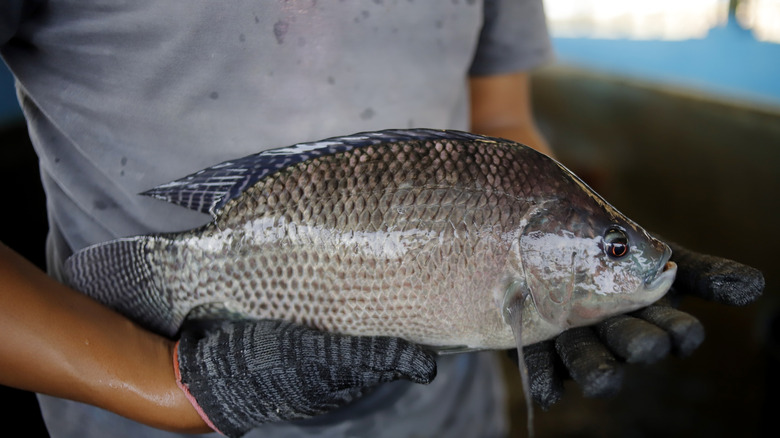Rockfish Vs Tilapia: What's The Difference?
As with any food, particularly proteins, picking the right fish can seem like a complex science. Whether you're choosing between freshwater or saltwater, looking at the nutritional content, or even just finding something that's easy to prepare, there are always factors to consider. On top of that, there are so many species that are commonly confused in the cooking world, so how could you possibly keep it all straight? The answer is taking it a few species at a time — so why not start with rockfish and tilapia?
Fortunately, rockfish and tilapia have almost nothing in common, with the exception of their being whitefish and popular menu items. They also have fairly similar nutritional values, with both fish containing similar amounts of vitamins, fats, and those amino acids we all look for in fish. Aside from that, however, these fish couldn't be more different, which makes it easier to shop for what's best for your recipes and dietary preferences.
The name rockfish refers to multiple species based on their, you guessed it, rocky American habitat. They tend to be on the larger side and have a firmer texture. Tilapia, on the other hand, come from the other side of the world, are much smaller fish, and have a much more delicate consistency. Because of these characteristics, rockfish and tilapia are best cooked in different scenarios. But it's preferable to learn more about each type of fish before tackling them in the kitchen.
What is rockfish?
Rockfish is a term that encompasses a variety of more than 70 species that live near the rocky shores of the North American West Coast. These saltwater fish are known for living in cold and nutrient-rich areas which is how they grow to be so dense before cooking into tender bites. Rockfish are also notably bigger than tilapia, weighing up to 5 pounds at their largest, and they come in a variety of bright colors. All of this contributes, though, to what really matters: what they taste like and how to cook them.
A rockfish's texture makes it ideal for higher-heat cooking, like grilling and frying, without falling apart. They are very hardy due to their size and flake less than other white fish, which means they are also great at absorbing spices and marinades. It's also worth noting that rockfish are rich in protein and could be a good option for those with a high-protein diet.
So we know they're good for cooking, but what the hell do you do with a whole rockfish? Rockfish are known to have a sweet, nuttier taste and a bolder flavor than other West Coast species, meaning they can be paired with equally bold ingredients. So making something like steamed rockfish with ginger and green onion or a teriyaki grilled rockfish is perfect for highlighting both the texture and taste of the fish and will also give you a delicious outcome.
What is tilapia?
On the opposite end of the fish scale (pun intended), we have tilapia: the invasive freshwater species that have found their home in seafood stalls all over the world, despite being native to Africa. Tilapia are much smaller compared to rockfish, usually weighing around one pound, and their adaptability allows them to thrive in fish farms. Because of this, tilapia is one of the most common fish found in grocery stores and restaurants alike.
Known to be quite versatile in the kitchen due to its mild yet slightly sweet flavor and soft and flaky texture, tilapia is also packed with protein. Tilapia is easy to prepare and its smaller filets are perfect for when you need a quick and easy meal.
However, note that tilapia's texture can pose challenges when being cooked in certain ways. While a newbie can easily prepare a tilapia fillet in a skillet, the fish's flakiness and tendency to fall apart means it's not the best fish steak for grilling beginners.
That said, since tilapia easily takes on outside flavors like spices and the smokiness of a grill, you'll definitely want to throw this fish on the barbie once you've gained confidence so you can get the full tasting experience. You could also try breading this delicate fish with an herby, almond crust for a more grounded flavor. But, regardless of how you season it, tilapia will always be a simple, popular, and affordable fish option — great for the nights when you're craving something lower maintenance than a whole rockfish.



